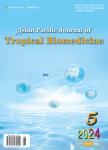Glucose-6-phosphate-dehydrogenase deficiency and its correlation with other risk factors in jaundiced newborns in Southern Brazil
Glucose-6-phosphate-dehydrogenase deficiency and its correlation with other risk factors in jaundiced newborns in Southern Brazil作者机构:Genetics ServiceHospital de Clinicas de Porto AlegrePGP in PediatricsUFRGS Pharmacy SchoolUFRGS Medical SchoolUFRGS
出 版 物:《Asian Pacific Journal of Tropical Biomedicine》 (亚太热带生物医学杂志(英文版))
年 卷 期:2011年第1卷第2期
页 面:110-113页
学科分类:1002[医学-临床医学] 100202[医学-儿科学] 10[医学]
基 金:Supported by FIPE.CnPq.Capes-Reuni and the Postgraduate Program of UFRGS
主 题:Glucosephosphate dehydrogenase Jaundice Hyperbilirubinemia Neonatal Hemoglobin
摘 要:Objective:To evaluate the correlation between glucose-6-phosphate-dehydrogenase(G6PD) deficiency and neonatal ***:Prospective,observational case-control study was conducted on 490 newborns admitted to Hospital de Clinicas de Porto Alegre for phototherapy, who all experienced 35 or more weeks of gestation,from March to December *** screening of G6PD activity was performed,followed by ***:There was prevalence of 4.6% and a boy-girl ratio of 3:1 in jaundiced *** jaundiced neonate with ABO incompatibility presented G6PD deficiency,and no Mediterranean mutation was found.A higher proportion of deficiency was observed in *** was no association with UGT1A1 variants. Conclusions:G6PD deficiency is not related to severe hyperbilirubinemia and considering the high miscegenation in this area of Brazil,other gene interactions should be investigated.



